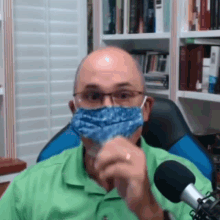Dad didn't like doctors. Long ago, Mom was in the hospital after abdominal surgery--for a mistaken diagnosis of appendicitis, if I remember right. She wasn't recovering from surgery, in fact, she was getting worse. When the hospital either couldn't or wouldn't do anything to help, Dad took her to another hospital, where they found her intestines had been put back in wrong. One of the nuns told Mom they almost lost her. At age 19 and with a 9th grade education, Dad had better judgment than the doctors at the first hospital.
Doctors were mostly quacks then; doctors are mostly quacks now. That so many lined up for an experimental shot with an absolute risk reduction of symptomatic COVID of about 1% and a horrendous adverse events profile and then forced it on staff, patients and everyone else they could strong-arm should tell you all you need to know. The continued mask mandates at hospitals should remove all doubt.
The Cochrane Collaboration just published their findings on whether masks stop or slow the spread of respiratory viruses. They reviewed 78 randomized, controlled studies that "took place in low-, middle-, and high-income countries worldwide: in hospitals, schools, homes, offices, childcare centres, and communities during non-epidemic influenza periods, the global H1N1 influenza pandemic in 2009, epidemic influenza seasons up to 2016, and during the COVID-19 pandemic. We identified five ongoing, unpublished studies; two of them evaluate masks in COVID-19." Results? It may make or probably makes no difference. That's not surprising since masks don't stop aerosols, which is how respiratory viruses spread.
After three years and 78--make that 79--studies to find out what carpenters, painters and anyone else who wears a mask to keep out dust and debris could have told them, hospitals and doctors offices still have mask mandates. Don't expect that to change.
In fact, there are still doctors who think low-carb diets can kill you. This case report, which seems to be from 2018, describes doctors diagnosing someone with rather low blood sugar as having...wait for it...ketoacidosis. Dr. Mike Eades wrote a blistering review of a case that was almost identical:
So, let’s see what we’ve got so far. An obese, 40 year old lady who has been nauseated and vomiting (4-6 times per day) for the past five days shows up in the emergency room. She is breathing a little faster than normal, but, given her weight, probably not by much. She doesn’t appear to be in any distress, and all her vital signs are normal. Her abdomen is a little tender (whose wouldn’t be after vomiting for five days?) and her bowel sounds are hyperactive (think of the last time you got some kind of abdominal flu; I would be willing to bet that you could hear your own bowels gurgling without the aid of a stethoscope). Every doctor who has treated patients for any length of time has seen this same picture over and over. It’s a diagnosis you can make from across the room.The patient has gastroenteritis, an infection (probably viral) of the gastrointestinal tract. She may be a little dehydrated if she hasn’t been able to keep any fluids down, but she doubtless has been able to hold some fluids on her stomach or her blood pressure would be low and her heart rate rapid from the dehydration.
If you’re the physician taking care of this patient you might want to run a couple of other tests just to make sure, which you do and find out that her blood sugar is normal (so you know she isn’t a diabetic in ketoacidosis) ...
In virtually all cases the patient will get well.
Instead, residents "Muldoon and Toody" (after inept characters on a TV show) panic and assume ketoacidosis because the patient was doing Atkins and her ketones were high.
In a typical teaching hospital, the attending physician, who would have had a number of years of patient experience, would gently (or maybe not so gently) tell the residents that they had overreacted a little and would walk them back through the situation with a Socratic-type dialogue that would probably go something like this:“You checked this patient’s blood sugar and it was normal, right? Okay, now, what does that blood sugar tell you about the condition of the patient’s pancreas? Uh huh, that’s right, it’s making plenty of insulin.
“Okay, now, if the patient is making plenty of insulin, is it really possible that she could be in life-threatening ketoacidosis? Okay, guys, let’s review how ketones are made…”
The later case report recommends "any person on the ketogenic diet should eat at least 100 g of carbohydrates a day to avoid ketoacidosis." That's not even a ketogenic diet. Quacks then, quacks now.

Comments